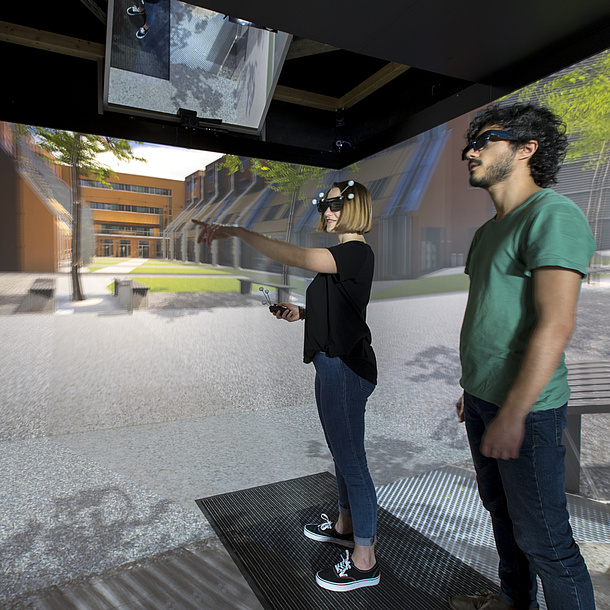- Duration of study: 6 semesters
- ECTS credit points: 180
- Academic degree: Bachelor of Science (BSc)
- Language of instruction: German,
many courses offered in English.
The Bachelor's Programme
In this bachelor's degree programme, you will learn the necessary fundamental skills to successfully develop software systems. These include skills in mathematics, software development, information processing, management and economics. You will learn how software is produced, how the associated data structures are organised and modelled and how software systems operate.
The consideration of economic conditions also plays an important role in this programme. Therefore, in addition to acquiring the necessary fundamental knowledge in information technology, you will also learn business skills related to planning, project management, cost management and quality management.
You will already experience the important connection between theoretical knowledge and practical application during the course of your studies. For example, you will conduct design exercises in the form of small software projects or have the opportunity to participate in research projects as part of your bachelor’s thesis.
Play video
Studying Software Engineering and Management
You have an opportunity to learn more in the following subject areas:
Fundamentals: You will learn the fundamentals of computer science as well as the mathematical foundations of computer science, such as analysis, discrete mathematics, numerical computing, linear algebra, probability theory and statistics.
Software Engineering: You will learn about basic and advanced software development. Specifically, you will learn, e.g. system-oriented programming, programming languages and about fundamental aspects of operating systems and software paradigms. In addition, you will explore human-computer interactions, computer graphics and machine vision and immerse yourself in the world of virtual and augmented reality.
Information Processing: Your research interests will include data management and data science as well as data structures and algorithms. You will learn how computers are constructed as well as programmed and networked. In the area of information security, a focus is placed on cryptography and computer security.
Management: You will become familiar with project management and acquire economic and legal fundamental knowledge, e.g. about business administration, accounting, business sociology, civil law and corporate law.
What will I have to do in the first semesters? How much practice can I expect? And what can I actually do with my degree when I've finished? Check what you expect!
Colleagues from the faculty will take time for you and your questions online:
To the Discord server of the Faculty of Computer Science and Biomedical Engineering
Contact: lse@tugraz.at
Computer science has become an integral part of our everyday lives. Software Engineering, as a sub-discipline of computer science, involves the development of software for complex applications. For example, software is developed in the field of individual mobility to improve vehicle safety, user interfaces and the user experience in (partially) autonomous cars.
Researchers in the field of software development at TU Graz are working on networked and autonomous cars and automated systems in aerospace industries, as well as rail and sea transportation, artificial intelligence for the digitalisation industry, incentive systems for individual energy optimisation using gamification and much more.
The practical relevance of the degree programme is demonstrated by the fact that more than 30 business start-ups, which employ more than 1000 people, have been founded by lecturers and students from the Faculty of Computer Science.
By taking part in various student teams, you can network with other students outside of your regular programme and work on IT topics such as the:
Admission
Requirements for admission to a bachelor's degree programme at TU Graz
Summer semester 2026
Admission period: 7 January to 5 February 2026
Winter semester 2026/27
Admission period: 6 July to 5 September 2026
Contact study@tugraz.at
Perspectives for Graduates
Graduates with a bachelor's degree in Software Engineering and Management are able to think abstractly and across disciplines. The acquired knowledge and the methodical and categorical approaches you learn will enable you to independently apply software solutions. This enables you to work in industry, service, public administration, business, education and science.
Graduates of this programme can enter numerous professional fields of activity. For example,
- Software developers,
- IT specialists,
- security administrators and
- project managers
are in high demand.
While it is possible to directly begin a career after completing the bachelor’s programme, you are also qualified to apply for one of the many available advanced master’s degree programmes.
After completing the bachelor's degree programme, you can enrol in the following master’s degree programmes without further requirements:
Information on other master's degree programmes with requirements you can find on the respective pages for the master’s degree programmes.
In addition, the bachelor's degree offers you the opportunity to apply internationally for master's degree programmes.




